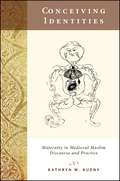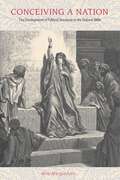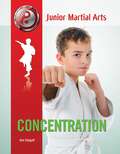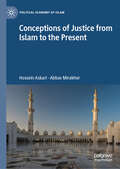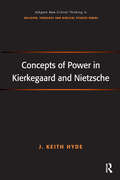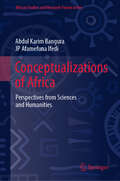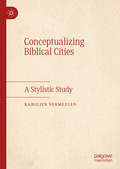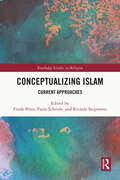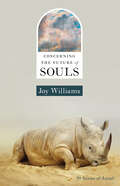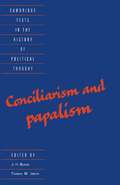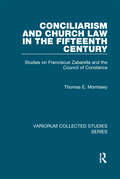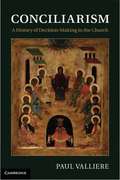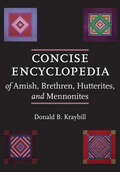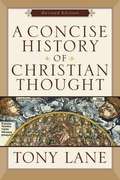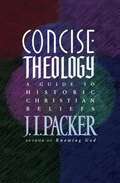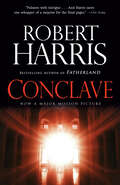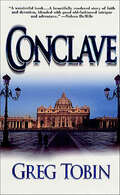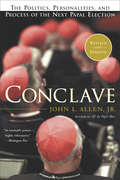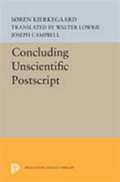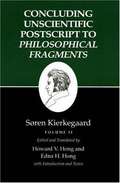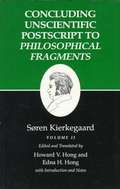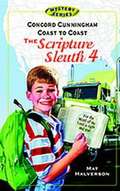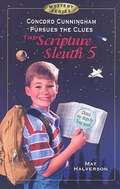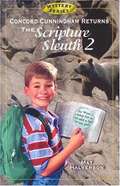- Table View
- List View
Conceiving Identities: Maternity in Medieval Muslim Discourse and Practice
by Kathryn M. KuenyFinalist for the 2014 Book Award for Excellence in the Study of Religion, textual studies category presented by the American Academy of ReligionConceiving Identities explores how medieval Muslim theologians appropriate a woman's reproductive power to construct a female gender identity in which maternity is a central component. Through a close analysis of seventh- through fourteenth-century exegetical works, medical treatises, legal pronouncements, historiographies, zoologies, and other literary materials, this study considers how medieval Muslim scholars map the female reproductive body according to broader, cosmological schemes to generate a woman's role as "mother." By close consideration of folk medicine and magic, this book also reveals how medieval women contest the traditional maternal identities imagined for them and thereby reinvent themselves as mothers and Muslims. This innovative examination of the discourse and practices surrounding maternity forges new ground as it takes up the historical and epistemic construction of medieval Muslim women's identities.
Conceiving a Nation: The Development of Political Discourse in the Hebrew Bible
by Mira MorgensternCurrent conflicts in both national and international arenas have undermined the natural, organic concept of nationhood as conventionally espoused in the nineteenth century. Conceiving a Nation argues that the modern understanding of the nation as a contested concept—as the product of a fluid and ongoing process of negotiation open to a range of livable solutions—is actually rooted in the Bible.This book draws attention to the contribution that the Bible makes to political discourse about the nation. The Bible is particularly well suited to this open-ended discourse because of its own nature as a text whose ambiguity and laconic quality render it constantly open to new interpretations and applicable to changing circumstances. The Bible offers a pluralistic understanding of different models of political development for different nations, and it depicts altering concepts of national identity over time. In this book, Morgenstern reads the Bible as the source of a dynamic critique of the ideas that are conventionally considered to be fundamental to national identity, treating in successive chapters the ethnic (Ruth), the cultural (Samson), the political (Jotham), and the territorial (Esther). Throughout, she explores a number of common themes, such as the relationship of women to political authority and the “strangeness” of Israelite political existence. In the Conclusion, she elucidates how biblical analysis can aid in recognition of modern claims to nationhood.
Concentration (Junior Martial Arts)
by Kim EtingoffMartial arts students don't just learn how to fight. They also learn lots of other important things they use every day--like concentration, for example. Martial artists are good at focusing on one thing at a time--and by practicing martial arts, you too can get better at concentrating. Concentration will help you do better in and out of school. Discover how martial arts can help you concentrate!
Conceptions of Justice from Islam to the Present (Political Economy of Islam)
by Abbas Mirakhor Hossein AskariThis book explains a perspective on the system of justice that emerges in Islam if rules are followed and how the Islamic system is differentiated from the conventional thinking on justice. It examines conceptions of justice from the Enlightenment to Bentham to Rawls to contemporary philosophers including Sen, Cohen, Nussbaum, and Pogge. The authors present the views of twentieth century Muslim thinkers on justice who see Muslims upholding rituals but not living according to Qur’anic rules. It provides empirical surveys of the current state of justice in Muslim countries analyzing the economic, social, and political state of affairs. The authors conclude by assessing the state of justice-injustice in Muslim countries and highlighting areas in need of attention for justice to prevail.
Concepts of Power in Kierkegaard and Nietzsche (Routledge New Critical Thinking in Religion, Theology and Biblical Studies)
by J. Keith HydeThe name Friedrich Nietzsche has become synonymous with studies in political power. The application of his theory that the vast array of human activities comprises manifestations of the will to power continues to influence fields as diverse as international relations, political studies, literary theory, the social sciences, and theology. To date, the introduction of Søren Kierkegaard into this discussion has been gradual at best. Long derided as the quintessential individualist, the social dimension of his fertile thought has been neglected until recent decades. This book situates Kierkegaard in direct dialogue with Nietzsche on the topic of power and authority. Significant contextual similarities warrant such a comparison: both severely criticized state Lutheranism, championed the self and its imaginative ways of knowing against the philosophical blitzkrieg of Hegelianism, and endured the turbulent emergence of the nation-state. However, the primary justification remains the depth-defying prescience with which Kierkegaard not only fully anticipates but rigorously critiques Nietzsche's power position thirty years in advance.
Conceptualizations of Africa: Perspectives from Sciences and Humanities (African Studies and Research Forum Series)
by Abdul Karim Bangura Jp Afamefuna IfediThis book discusses how Africa has been understood and defined across various academic fields. Building on the influential works of Valentin-Yves Mudimbe and more recent studies by Axel Fleisch and Rhiannon Stephens, this book bridges previous limitations by offering a comprehensive, interdisciplinary analysis. Each chapter examines the conceptualization of Africa within a specific discipline, balancing local and global perspectives, blending competing viewpoints, and providing suggestions for future research. The book will be essential for students, scholars, and researchers interested in a better understanding of the diverse and complex narratives that shape our knowledge of Africa and its intellectual heritage.
Conceptualizing Biblical Cities: A Stylistic Study
by Karolien VermeulenThis book offers a comprehensive treatment of the city image in the Hebrew Bible, with specific attention to stylistics. By engaging with spatial theory (Lefebvre 1974, Soja 1996), the author develops a new framework to analyse the concept of ‘city’, arguing that a set of conceptual images defines the Biblical Hebrew city, each of them constructed using the same linguistic toolkit. Contrary to previous studies, the book shows that biblical cities are not necessarily evil or female. In addition, there is no substantial difference between the metaphorical images used for Jerusalem and those used for other cities. This book will be of interest to students and scholars of stylistics, urban studies, critical-spatial theory and biblical studies (especially Biblical Hebrew).
Conceptualizing Islam: Current Approaches (Routledge Studies in Religion)
by Frank Peter Paula Schrode Ricarda StegmannIn recent decades, academic debates on how to conceptualize ‘Islam’ as an object of study and how to approach it theoretically have been revitalized. Not only has research on Islam grown enormously and become much more differentiated, but Islam is also being discussed more intensively in society and politics than ever before.This reader, which brings together the perspectives of various disciplines, provides an overview of academic approaches to Islam against the backdrop of these, in some cases tense, entanglements. Through two contributions from scholars working on Buddhism and Hinduism, these debates are situated in the context of broader trajectories of research history. In sum, this book does not only offer its readers entry points to a more complex and refined understanding of Islam, but also to research processes within the study of Islam as well as religion in general.
Concerning the Future of Souls
by Joy Williams“Quite possibly America's best living writer of short stories.”—NPR “Williams is a writer for our times: both visionary and caustic, knowing yet also full of wonder.”—Catherine Taylor, The Financial Times Returning to her legendary short stories, Pulitzer Prize and National Book Award finalist Joy Williams offers a much-anticipated follow-up to Ninety-Nine Stories of God, which The New York Times Book Review called a “treasure trove of bafflements and tiny masterpieces.” Concerning the Future of Souls balances the extraordinary and the humble, the bizarre and the beatific, as Azrael—transporter of souls and the most troubled and thoughtful of the angels—confronts the holy impossibility of his task, his uneasy relationship with Death, and his friendship with the Devil. Over the course of these ninety-nine illuminations, a collection of connected and disparate beings—ranging from ordinary folk to grand, known figures such as Jung, Nietzsche, Pythagoras, Bach, and Rilke; to mountains, oceans, dogs, birds, whales, horses, butterflies, a sixty-year-old tortoise, and a chimp named Washoe—experience the varying fate of the soul as each encounters the darkness of transcendence in this era of extinction. A brilliant crash course in philosophy, religion, literature, and culture, Concerning the Future of Souls is an absolution and an indictment, sorrowful and ecstatic. Williams will leave you wonderstruck, pondering the morality of being mortal.
Conciliarism And Papalism
by Quentin Skinner Raymond Geuss Thomas M. Izbicki J. H. BurnsAlmost on the eve of the sixteenth-century Reformation, the long-running debate over the respective authority of popes and councils in the Catholic Church was vigorously resumed. In this collection the editors bring together the first English translation of four major contributions to that debate. In these texts, complex arguments derived from Scripture, theology, and canon law are deployed. The issues that emerge, however, prove to have a broader significance. What is foreshadowed here is the confrontation between 'absolutism' and 'constitutionalism' which was to be a dominant theme in the politics of early-modern Europe and beyond. Even on the threshold of the twenty-first century the concerns that underlie and animate the scholastic disputations in these pages retain their force. This 1997 volume includes introductory material which elucidates the context of the debate, as well as a comprehensive bibliography.
Conciliarism and Church Law in the Fifteenth Century: Studies on Franciscus Zabarella and the Council of Constance (Variorum Collected Studies)
by Thomas E. MorrisseyCrises are never the best of times and the era of the Great Western Schism (1378-1417) easily qualifies as one of the worst of times. As a professor of canon law at the University of Padua and later cardinal, and as a major theorist in the conciliarist movement, Franciscus Zabarella (1360-1417) tried to do what a good legal mind does: find and explicate a viable and legal solution to the crises of his time, a solution that would stand up in his own era and for the generations that followed. In this volume Thomas Morrissey looks at what he said, wrote and did, and places him and his thought in the context of the late medieval and early modern era, how he reflected that world and how he influenced it. Particular studies elucidate what he wrote on the authority and on the duty of the people in power, what they could do and should do, as well as what they should not do. They also show how he explored the area of early constitution law and human rights in civil and religious society and that his work leads down the road to our modern constitutional democratic societies. The volume includes two previously unpublished studies, on the situation in Padua c. 1400 and on a sermon from 1407, together with an introduction contextualizing the articles.
Conciliarism: A History of Decision-making in the Church
by Paul ValliereConciliarism is one of the oldest and most essential means of decision-making in the history of the Christian Church. Indeed, as a leading Orthodox theologian Alexander Schmemann states, 'Before we understand the place and the function of the council in the Church, we must, therefore, see the Church herself as a council.' Paul Valliere tells the story of councils and conciliar decision-making in the Christian Church from earliest times to the present. Drawing extensively upon the scholarship on conciliarism which has appeared in the last half-century, Valliere brings a broad ecumenical perspective to the study and shows how the conciliar tradition of the Christian past can serve as a resource for resolving conflicts in the Church today. The book presents a conciliarism which involves historical legacy, but which leads us forward, not backward, and which keeps the Church's collective eyes on the prize - the eschatological kingdom of God.
Concise Encyclopedia of Amish, Brethren, Hutterites, and Mennonites
by Donald B. KraybillDonald B. Kraybill has spent his career among Anabaptist groups, gaining an unparalleled understanding of these traditionally private people. Kraybill shares that deep knowledge in this succinct overview of the beliefs and cultural practices of Amish, Brethren, Hutterites, and Mennonites in North America.Found throughout Canada, Central America, Mexico, and the United States, these religious communities include more than 200 different groups with 800,000 members in 17 countries. Through 340 short entries, Kraybill offers readers information on a wide range of topics related to religious views and social practices. With thoughtful consideration of how these diverse communities are related, this compact reference provides a brief and accurate synopsis of these groups in the twenty-first century.No other single volume provides such a broad overview of Amish, Brethren, Hutterites, and Mennonites in North America. Organized for ease of searching—with a list of entries, a topic finder, an index of names, and ample cross-references—the volume also includes abundant resources for accessing additional information.Wide in scope, succinct in content, and with directional markers along the way, the Concise Encyclopedia of Amish, Brethren, Hutterites, and Mennonites is a must-have reference for anyone interested in Anabaptist groups.
Concise History of Christian Thought (Completely Revised and Expanded Edition)
by Tony LaneA Concise History of Christian Thought offers a succinct, readable survey of key Christian thinkers and significant theological developments from the church's inception to the present. In addition to surveying over one hundred important Christian thinkers from Justin Martyr to Joseph Ratzinger (Pope Benedict XVI), the book also covers major creeds, councils, and documents. Representative extracts allow the reader to hear from each of the key thinkers in his or her own words. After having sold more than 50,000 copies in its earlier editions, the current edition has been refined and updated throughout and includes new material on key contemporary thinkers. It will appeal to church leaders, interested laity, and students.
Concise Theology: A Guide to Historic Christian Beliefs
by J. I. PackerThis summary of Christian teaching covers nearly one hundred major theological points from a biblical Reformed perspective, in brief, easy-to-understand chapters. By the author of Knowing God.
Conclave
by Robert HarrisThe Pope is dead. Behind the locked doors of the Sistine Chapel, one hundred and twenty Cardinals from all over the globe will cast their votes in the world's most secretive election. They are holy men. But they have ambition. And they have rivals. Over the next seventy-two hours one of them will become the most powerful spiritual figure on earth.
Conclave: A Novel (Holy See Trilogy #1)
by Greg TobinBorn and raised in suburban New Jersey, Timothy John Mulrennan has known since childhood a deep and abiding faith in his God and his Church that leads him to a career as a priest-and propels him onto the stage of world events that include the Second Vatican Council, the Vietnam War, and the election of the first Supreme Pontiff of the Roman Catholic church of the third millennium. Along the way he encounters some of the most remarkable characters in contemporary fiction: Henry Martin Vennholme, leader of the conservative lay movement called Evangelium Christi, and Mulrennan's bitterest enemy within the church . . . Rachel Seredi, a beautiful artist from Hungary who falls in love with Bishop Mulrennan and gives him the greatest gift a woman ever could...Cardinal Leandro Biagi, a wily and urbane politician who would be at home in the time of the Medicis and Borgias...and Jaime de Guzman, the Archbishop of Manila and longtime friend of Tim Mulrennan's, the one man who speaks in the American's defense during the divided conclave and who pays the ultimate price for his honesty and faith in God.At the Publisher's request, this title is being sold without Digital Rights Management Software (DRM) applied.
Conclave: The Politics, Personalities and Process of the Next Papal Election
by John L. Allen Jr.A captivating, insider's guide to the politics and personalities that will have a tremendous impact on one of the world's most secretive and important events--the election of a pope to succeed John Paul II. The next time a conclave unfolds in Rome, some 6,000 journalists are expected to descend on the Eternal City to cover the death of John Paul II and report on the election of his successor. The man in white who emerges from the Sistine Chapel at its conclusion will automatically become one of the most important figures on earth, a leader who commands a unique combination of political and spiritual power. Depending on how he chooses to exercise that power, governments and political systems may rise or fall, religious wars may heat up or abate, and the Church may undergo a radical transformation-from changes in its stances on such issues as sexuality, the place of women in the Church, to the role of the papacy itself. Conclave is a fascinating look at the election process and at what this headline-making occasion will mean to the world. John L. Allen, Jr. , takes readers behind the scenes to reveal the issues, parties, and people most likely to determine the outcome. Setting the election within a broader context, he explains why it matters who becomes pope, discusses their role in the modern world, and examines the issues that will form the agenda of the next papacy. Although the book is not intended as a "handicapper's guide," Allen does offer his own informed list of the "top twenty" contenders for the position. He creates, as well, a classification system that clarifies the differences among the informal political parties that exist within the College of Cardinals, the body of 130-plus men who will elect John Paul II's successor. In conclusion, he presents a critical, independent-minded profile of each of those cardinals--for one of them will certainly be the new pope.
Concluding Unscientific Postscript (Princeton Legacy Library #5524)
by Joseph Campbell Søren Kierkegaard Walter LowrieThe Princeton Legacy Library uses the latest print-on-demand technology to again make available previously out-of-print books from the distinguished backlist of Princeton University Press. These editions preserve the original texts of these important books while presenting them in durable paperback and hardcover editions. The goal of the Princeton Legacy Library is to vastly increase access to the rich scholarly heritage found in the thousands of books published by Princeton University Press since its founding in 1905.
Concluding Unscientific Postscripts to Philosophical Fragments (Volume I, Text)
by Howard V. Hong Edna H. Hong Søren KierkegaardIn Philosophical Fragments the pseudonymous author Johannes Climacus explored the question: What is required in order to go beyond Socratic recollection of eternal ideas already possessed by the learner? Written as an afterword to this work, Concluding Unscientific Postscript is on one level a philosophical jest, yet on another it is Climacus's characterization of the subjective thinker's relation to the truth of Christianity. At once ironic, humorous, and polemical, this work takes on the unscientific form of a mimical-pathetical-dialectical compilation of ideas. Whereas the movement in the earlier pseudonymous writings is away from the aesthetic, the movement in Postscript is away from speculative thought. Kierkegaard intended Postscript to be his concluding work as an author. The subsequent second authorship after The Corsair Affair made Postscript the turning point in the entire authorship. Part One of the text volume examines the truth of Christianity as an objective issue, Part Two the subjective issue of what is involved for the individual in becoming a Christian, and the volume ends with an addendum in which Kierkegaard acknowledges and explains his relation to the pseudonymous authors and their writings. The second volume contains the scholarly apparatus, including a key to references and selected entries from Kierkegaard's journals and papers.
Concluding Unscientific Postscripts to Philosophical Fragments (Volume II, Historical Introduction, Supplement, Notes, and Index)
by Howard V. Hong Edna H. Hong Søren KierkegaardIn Philosophical Fragments the pseudonymous author Johannes Climacus explored the question: What is required in order to go beyond Socratic recollection of eternal ideas already possessed by the learner? Written as an afterword to this work, Concluding Unscientific Postscript is on one level a philosophical jest, yet on another it is Climacus's characterization of the subjective thinker's relation to the truth of Christianity. At once ironic, humorous, and polemical, this work takes on the "unscientific" form of a mimical-pathetical-dialectical compilation of ideas. Whereas the movement in the earlier pseudonymous writings is away from the aesthetic, the movement in Postscript is away from speculative thought. Kierkegaard intended Postscript to be his concluding work as an author. The subsequent "second authorship" after The Corsair Affair made Postscript the turning point in the entire authorship. Part One of the text volume examines the truth of Christianity as an objective issue, Part Two the subjective issue of what is involved for the individual in becoming a Christian, and the volume ends with an addendum in which Kierkegaard acknowledges and explains his relation to the pseudonymous authors and their writings. The second volume contains the scholarly apparatus, including a key to references and selected entries from Kierkegaard's journals and papers.
Concord Cunningham Coast to Coast (The Scripture Sleuth #4)
by Mathew HalversonThe Scripture Sleuth books are fun, lighthearted interactive adventures. The readers have to look up Bible verses for the solution to the mystery.
Concord Cunningham Pursues the Clues (The Scripture Sleuth #5)
by Mathew HalversonA gift from outer space is about to be stolen. Cheaters are about to win the Pine Tops Marathon. A fancy wedding is seconds away from disaster unless someone can reach a runaway ring. Who can stop these crimes and solve these puzzles before it's too late? Grab your Bible, follow the clues, and you can crack every case!
Concord Cunningham Returns (The Scripture Sleuth #2)
by Mathew HalversonAn anthology of short stories starring Concord Cunningham. Concord is a young boy who uses a Bible concordance to solve the mysteries in his neighborhood. This has earned him the nickname "Scripture Sleuth".
